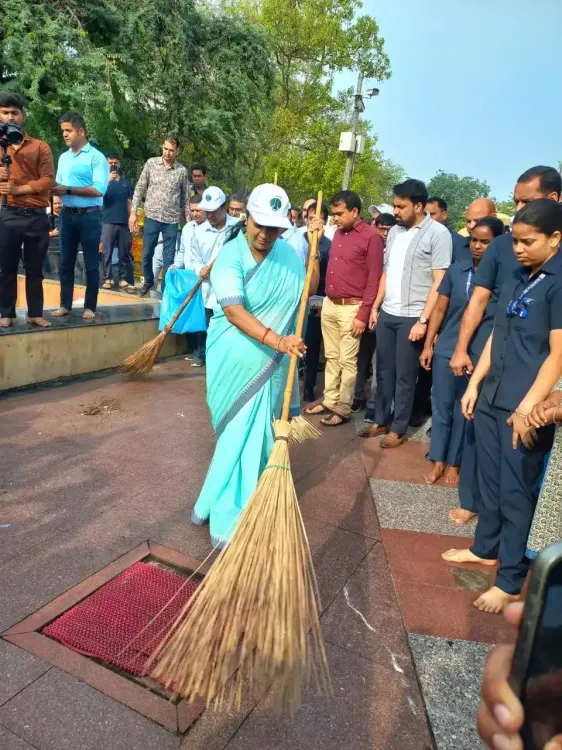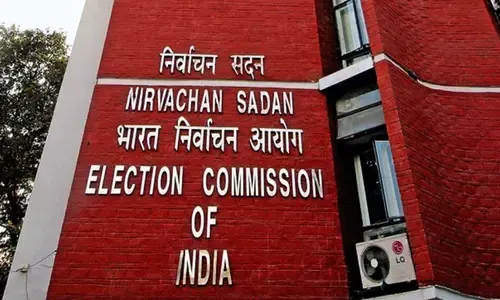How is Delhi CM Gupta Promoting Cleanliness at Hanuman Mandir?

Synopsis
Key Takeaways
- Community Engagement: Involvement of citizens and officials is crucial for effective cleanliness efforts.
- Symbolic Actions: Participating in symbolic activities helps raise awareness about cleanliness.
- Collective Responsibility: Cleanliness is a shared duty that requires everyone’s commitment.
- Long-term Vision: Initiatives like this contribute to long-term environmental sustainability.
- Public Participation: Encouraging citizens to take active roles is key to success.
New Delhi, May 6 (NationPress) -- Delhi's Chief Minister, Rekha Gupta, actively participated in a cleanliness initiative by engaging in ‘Shramdan (service)’ at the Hanuman Mandir complex located in Connaught Place on Tuesday. She emphasized that the essence of this symbolic event is to inspire elected officials, representatives, and Residents' Welfare Associations (RWAs) to join forces in beautifying Delhi.
“Maintaining a clean and green Delhi is a collective duty. We must all step out to contribute to this 20-day cleanliness campaign across the city,” she remarked.
Gupta highlighted the expectation that officials will take part in these efforts, while citizens should report any instances of waste or pollution to the government.
Accompanied by Kuljeet Singh Chahal, Vice Chairman of the New Delhi Municipal Council, the CM symbolically swept the area and collected waste into a dustbin.
In a media interaction, she urged RWAs and organizations hosting public events to ensure cleanliness at their venues post-event.
On her official social media account on X, she shared, “Today, I offered prayers at the historic Hanuman temple in Connaught Place and participated in the cleanliness drive organized by the NDMC. This initiative is a significant step towards transforming our capital into a clean, beautiful, and healthy space. This campaign aligns with #SwachhBharatAbhiyan, launched by Hon'ble Prime Minister Shri @narendramodiji, fostering a national consciousness towards cleanliness and turning it into a mass movement.”
“Let’s pledge that cleanliness should transcend mere campaigns and become a habitual responsibility. Together, we can construct a developed and clean India that inspires future generations,” she added.
Chahal noted that the ‘Mega Cleanliness Campaign’ at Hanuman Mandir is part of the ‘One Hour Daily Shramdaan’ initiative, which involves 9,000 NDMC employees committed to realizing Prime Minister Narendra Modi’s vision of 'Viksit Bharat, Viksit Delhi.'
The previous day, Chahal and NDMC officials undertook one-hour cleanliness drives at various locations.
Under this campaign, staff from multiple NDMC departments—including Education, Architecture, Civil Engineering, Health, and Fire Services—enthusiastically participated, he stated.
NDMC Chairperson Keshav Chandra led a cleanup at Safdar Hashmi Marg, while Council Member D.P. Singh focused on Lodhi Colony, and Council Member Sarita Tomar targeted the Moti Bagh area, alongside other NDMC departments.
An official noted, “In the upcoming days, more distinguished figures, public representatives, and leaders from social organizations will join the drive, not only demonstrating their commitment to cleanliness but also significantly contributing to spreading hygiene awareness within society. Their involvement will inject fresh energy and public support into this campaign.”
This drive is set to continue until May 9 across all 14 sanitation divisions of the NDMC, with each department’s personnel dedicating one hour daily from 8 A.M. to 9 A.M. towards cleanliness efforts.
“Citizens from diverse backgrounds and volunteers are also actively participating. Furthermore, all schools, sub-stations, hospitals, and dispensaries are conducting simultaneous cleanliness drives within their facilities,” Chahal added.
Chahal lauded this as a historic civic initiative for the NDMC, noting that, for the first time, all employees are engaging in public cleaning activities before commencing their official duties.










